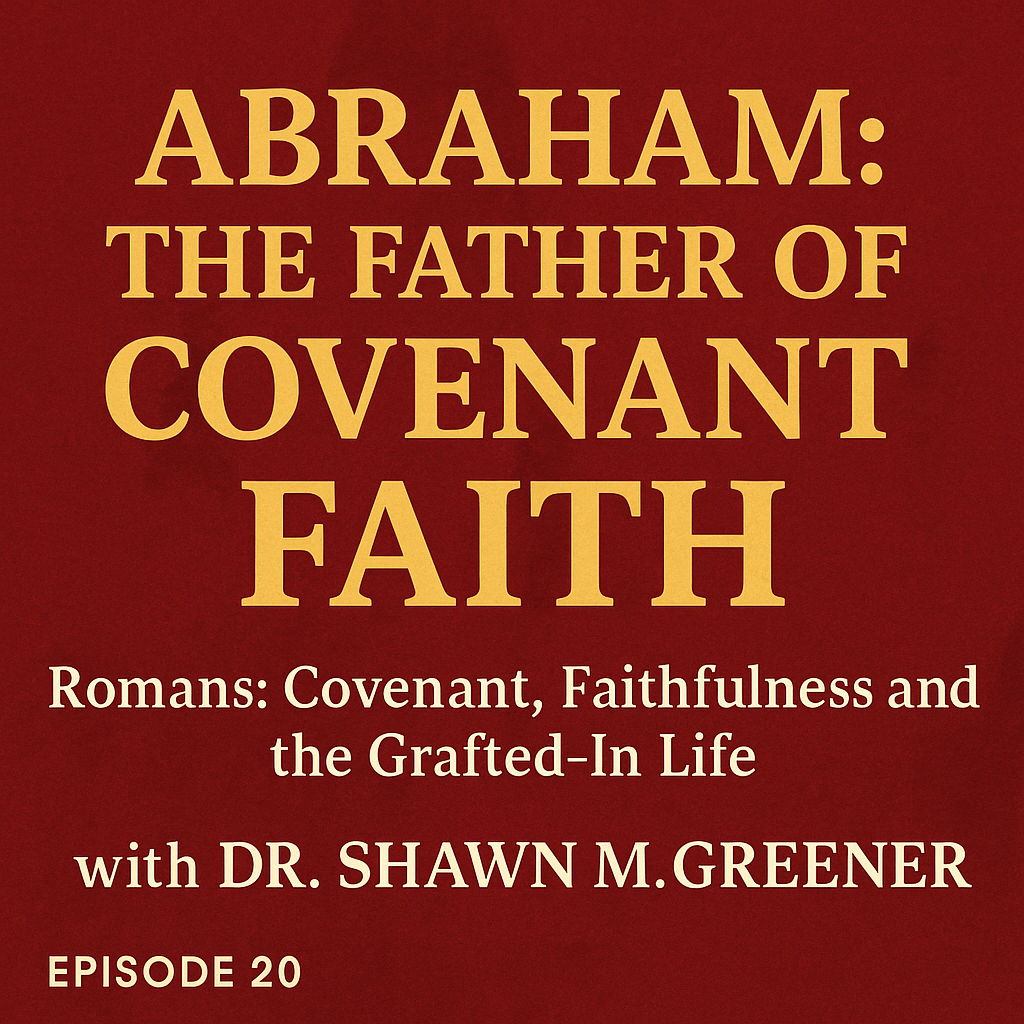What Does Romans 4 REALLY Teach About Abraham’s Faith?

What Does Romans 4 REALLY Teach About Abraham’s Faith?
WATCH on RUMBLE!
WATCH on YouTube!
Series: Romans: Covenant, Faithfulness, and the Grafted-In Life
What if faith is not about believing the right ideas but about walking in loyal trust? What if Abraham’s story is not just ancient history but the blueprint for every follower of Yeshua today? Romans 4 invites us to return to the foundation of covenant faith. Abraham’s journey reveals what it means to live as a friend of God, not by ritual, heritage, or law, but by relational trust and obedient loyalty.
Abraham believed God, and it was counted to him as righteousness. Those ten Hebrew words in Genesis 15:6 are the cornerstone of Paul’s argument. The Hebrew word he’emin means to stand firm, to trust with stability, to lean your full weight upon. It is not intellectual assent but covenant faithfulness in motion. Dr. Skip Moen notes that emunah (faith) and aman (to support or confirm) come from the same root. To have faith in God is to rely upon Him completely and to act in ways that demonstrate loyalty. Abraham’s belief was not mere confession; it was embodied obedience. When God said “Go,” Abraham went. When God said “Offer,” he lifted the knife. His righteousness was not earned but proven in trust.
Paul reminds his readers that Abraham was declared righteous before he was circumcised. Covenant relationship preceded ritual. Circumcision was the sign, not the source, of his faith. In the same way, God’s grace comes before our obedience. Obedience is our response, not the reason for His favor. Dr. Michael Heiser explained that in the ancient Near Eastern worldview, covenants were relational contracts of loyalty, not mere legal documents. God’s covenant with Abraham was His commitment to bless all nations, and that plan never depended on human perfection but on divine fidelity.
Romans 4:18 says Abraham “hoped against hope.” His body was as good as dead, and Sarah’s womb barren. Yet he did not waver. Why? Because covenant faith does not rest on circumstances but on the character of the Promise-Giver. In Hebraic thought, hope (tikvah) is not wishful thinking; it is tethered expectation, like a rope tied to a secure post. Abraham’s hope was tied to God’s unbreakable Word. Rabbi Nachmanides wrote that true faith is seen when a man believes even while reason fails him. Abraham modeled this. He believed beyond what was reasonable.
Taco Tony once told me, “Doc, if God told me I’d have a baby at 100, I’d ask Him what brand of vitamins He’s taking.” Abraham didn’t ask for vitamins; he asked for vision.
Paul concludes, “It was counted to him” was not written for him alone but for us also, who believe in Him who raised Yeshua from the dead. Abraham’s faith was a preview of the Gospel. The same covenant God who credited righteousness to Abraham has now revealed His righteousness through Messiah. Faith, from Genesis to Revelation, is the same covenant loyalty. The story has always been about trusting the Faithful One who keeps His Word.
The challenge: Where in your life are you trusting your performance instead of His promise? The choice: Will you live in the anxious striving of works, or in the restful loyalty of faith?
This week, our community felt that truth in a tender way with the passing of our dear sister in the faith, Miss Linda Andzulis. Moments like these remind us that our faith is not just about living well but about dying in peace, with hope that does not fade. And it is in that sacred hope that I want to share something beautiful with you; a glimpse of Heaven and the promise that gave Miss Linda such peace.
When we lose someone precious to us, our hearts ache in ways words can hardly express. Yet for those who belong to Yeshua, sorrow never has the final word. Revelation 21:4 tells us, “He will wipe away every tear from their eyes. There will no longer be any death, and there will no longer be any mourning, crying, or pain, for the old order has passed away.” That is not poetry or wishful thinking. It is the unshakable promise of the Living God.
Miss Linda Andzulis believed that promise. In her final days, she rested in the blessed assurance that her Redeemer lives. She found comfort in knowing that one day, every tear of this life would be wiped away by the very hand of her Savior. The peace she carried was not denial of grief but the deep conviction that beyond this temporary world waits an eternal home. There she will be reunited with her beloved husband of sixty-three years, Mr. Vic, and she will stand face to face with her Lord, her Redeemer, and her Friend.
As Isaiah 25:8 declares, “He will swallow up death forever. Adonai Elohim will wipe away the tears from every face.” And in 1 Thessalonians 4:13–14 we are reminded, “We do not grieve as those who have no hope, for we believe that Yeshua died and rose again, and so we believe that God will bring with Yeshua those who have fallen asleep in Him.” That same hope that gave Miss Linda her peace is offered to you tonight.
If you long for that same assurance, if you’re ready to know the peace of eternal life with God, then open your heart right now. Wherever you are, take a deep breath, quiet your mind, and join me in this prayer of salvation.
SALVATION PRAYER
Heavenly Father, I come to You today with an open and humble heart. I know that I have sinned and fallen short of Your glory, and I ask for Your forgiveness. Right now, I turn away from my sins and turn fully toward You. I believe that Jesus, Your Son, is the promised Messiah, that He died for my sins, was buried, and rose again on the third day just as the Bible says. Today I call on Your holy Name. Please forgive me, cleanse me, and make me new. Fill me with Your Holy Spirit and write Your truth upon my heart. From this day forward I choose to follow Jesus as my Lord, my Redeemer, and my King. Thank You for loving me, for saving me, and for making me part of Your family forever. In the Name of Jesus Christ, the King of Kings, I pray. Amen.
If you prayed that prayer, visit TrueWordFaithforLife.com/contact and I will personally help you take your next steps of faith.
Before you go, I want to ask one simple favor. If this message blessed you or helped you understand the Bible more clearly, share it with someone who needs encouragement. Be that friend who shares light in a world of confusion. If you prefer not to share, please email me at EMAIL ME! and tell me why. I truly want to understand how to serve hearts hungry for truth.
Beloved, Abraham’s story is not about ancient heroes but about covenant faith. The same God who called him calls you. The same faith that justified him justifies you. The same Spirit that sustained him now strengthens you. Live in covenant trust. Live in humble obedience. Live as a child of Abraham through Messiah.
Shalom b’Shem Yeshua.
© 2025 Dr. Shawn M. Greener. All Rights Reserved.
True Word, Faith for LIFE!
Romans 4: Abraham – The Father of Covenant Faith
Series: Romans: Covenant, Faithfulness, and the Grafted-In Life
Key Passage: Romans 4:1–25
Romans 4 explains that Abraham’s faith is the prototype of covenant righteousness. Paul draws from Genesis 15 to show that justification by faith was always God’s plan. Salvation is not a new idea in the New Testament; it is the ancient promise fulfilled in Messiah. Faith is not mental agreement but covenant loyalty expressed through trust and obedience.
Abraham as Example (4:1–3): Paul recalls Abraham’s faith counted as righteousness. The Hebrew he’emin means steadfast trust. Faith precedes works; relationship precedes ritual.
Grace versus Wages (4:4–8): Works earn debt; faith receives grace. Psalm 32 reminds us, “Blessed are those whose lawless deeds are forgiven.” True righteousness is credited, not calculated.
Circumcision and Faith (4:9–12): Abraham was justified before circumcision. Faith, not ritual, defines covenant identity. Dr. Skip Moen notes that Torah obedience flows from gratitude, not obligation.
Promise by Faith (4:13–17): The promise preceded Torah, showing grace is older than law. Dr. Michael Heiser connects this to the Deuteronomy 32 worldview: God’s plan to bless all nations through Abraham’s seed reverses Babel’s disinheritance.
Faith Against Hope (4:18–21): Abraham believed the impossible. Rabbi Rashi wrote that Abraham’s faith “rested upon nothing but the Word of the Holy One.” True faith grows stronger in impossibility.
Application for Believers (4:22–25): What was written for Abraham is written for us. Messiah fulfills God’s covenant promise. Faith in the resurrected Messiah is participation in Abraham’s righteousness.
He’emin – Hebrew – To believe, to stand firm – Abraham’s trust in God’s promise.
Emunah – Hebrew – Faithfulness, steadfast loyalty – Covenant obedience born of trust.
Tzedakah – Hebrew – Righteousness, covenant justice – God’s faithfulness to His promise.
Dikaiosune – Greek – Righteousness, right standing – God’s covenant faith in Messiah.
Brit – Hebrew – Covenant, binding relationship – God’s unbreakable promise.
- What does Abraham’s example teach us about faith that acts rather than faith that feels?
- How does understanding emunah reshape the way you see obedience?
- Where have you seen “faith against hope” in your own life?
Faith is not passive belief but active trust. Abraham’s faith involved movement, risk, and surrender. In the same way, living by faith today means aligning our actions with what we claim to believe. Identify one area of your life where you need to trust God’s covenant promise more fully. Write it down, pray over it, and act on it this week.
Skip Moen, Hebrew Word Study: Revealing the Heart of God (Orlando: At God’s Table, 2014).
Michael S. Heiser, The Unseen Realm: Recovering the Supernatural Worldview of the Bible (Bellingham, WA: Lexham Press, 2015).
Rashi, Commentary on Genesis 15:6, Complete Jewish Study Bible (Peabody, MA: Hendrickson, 2016).
Ramban (Nachmanides), Commentary on the Torah (New York: Shilo Publishing House, 1971).
Complete Jewish Study Bible. Peabody, MA: Hendrickson Publishers, 2016.
Heiser, Michael S. The Unseen Realm: Recovering the Supernatural Worldview of the Bible. Bellingham, WA: Lexham Press, 2015.
Moen, Skip. Hebrew Word Study: Revealing the Heart of God. Orlando: At God’s Table, 2014.
Ramban, Nachmanides. Commentary on the Torah. New York: Shilo Publishing House, 1971.






